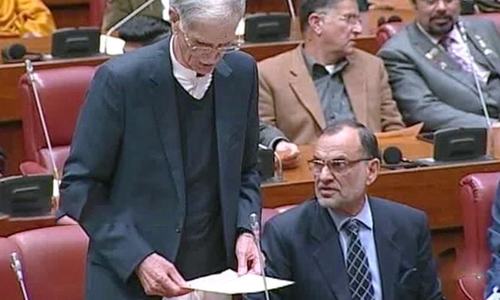ISLAMABAD: The hasty passage of the services chiefs’ tenure bills from the two houses of the Parliament has brought the legislative process under public scrutiny and exposed lack of interest being shown by the government and opposition members to ordinary legislation.
The crucial bills empowering the prime minister to give extension to the three services chiefs were passed by the National Assembly, Senate as well as their respective committees within days at a time when over 140 government and private member’s bills have been pending before standing committees for months.
In their background interviews, members of major political parties though acknowledged that they had passed the three bills in an inappropriate manner, they have different reasons for justifying it. The members of the government and the opposition also admit that the parliamentary committees are not holding meetings regularly to clear the backlog. However, the two sides hold each other responsible for it.
Parliamentary experts believe that in the whole process, at least the two committees of the houses on defence have been exposed as “redundant” as their members were not allowed to suggest any changes to the drafts and were asked to stamp their approval as per broad understanding between the government and the opposition parties.
Over 140 bills pending before parliamentary committees
The opposition had objected to the government’s move of referring the bills to a joint meeting of the Senate and the NA committees on defence. The opposition was of the view that rules did not provide for any such arrangements and the senators had attended the meeting as special invitees without having the right of vote. The government had agreed to the opposition’s proposal for the sake of consensus.
The recent developments have also once again stirred a debate within the parties and parliamentary experts regarding the need for having a system of joint committees of the two houses to save time and expenses.
When contacted, PPP’s Syed Naveed Qamar defended the hasty passage of the services chiefs’ tenure bills, saying the bills had been introduced under “extraordinary circumstances.”
Mr Qamar said under normal situations, the committees all over the world were considered to be the best place where the government took input from stakeholders and other parties, including the opposition. In this case, however, he said, the government did not even want to take the bills to the committees and it was on the opposition’s insistence that it finally agreed to do so.
Mr Qamar, who has a vast parliamentary experience, did not support the idea of formation of joint committees of the two houses. He said if the government managed to get a controversial bill passed from the National Assembly merely on the basis of its majority, then the Senate could block it. Besides, the parliament through the Senate committees has the opportunity to improve the draft and remove errors.
Former Senate chairman and PPP secretary general Nayyar Bokhari, who had floated the proposal for formation of joint committees of the two houses, said the move could save time and money.
Another former Senate chairman and PPP stalwart Raza Rabbani said he believed there should be some joint and some individual committees. For example, the two houses must have a joint committee on laws. However, joint committees should only be constituted in a joint session of the parliament.
Leader of the House in the Senate and a member of the ruling Pakistan Tehreek-i-Insaf, Shibli Faraz, held the opposition responsible for the slow legislative process. He alleged that the opposition due to its numerical strength in the Senate always blackmailed the government.
He said there were pros and cons to the idea of having joint committees, but he personally supported the existing system of separate committees. He said that it had been observed that the MNAs were mostly focused on their constituencies and could not focus on legislations and scrutinise it minutely. On the other hand, a serious and meaningful discussion takes place in the Senate.
Statistical data
The official record of the National Assembly Secretariat reveals that the lower house has so far been able to pass 24 bills, including the three finance bills and the three services chiefs bills, since it came into existence in August 2018. On the other hand, the government has laid the same number of 24 ordinances in the National Assembly during this period.
When the National Assembly completed its first parliamentary year on Aug 12 last year, more than 50 government and private member’s bills were pending before the house committees, which had been constituted by Speaker Asad Qaiser after an inordinate delay due to a controversy over chairmanship of the most-powerful Public Accounts Committee. And now, when the assembly is completing five months of the second parliamentary year, the number of pending bills before the committee has doubled.
Published in Dawn, January 13th, 2020















































